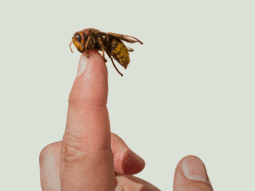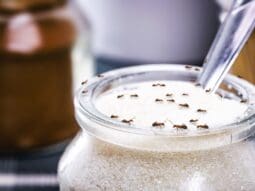

You've just wiped down the kitchen counter for the third time today, and you spot it, a tiny ant marching boldly across the granite like it owns the place. Or maybe it's fruit flies hovering around the bananas, or a spider claiming the corner of your living room as its new home. Whatever the uninvited guest, you want it gone, but you also don't want to spray harsh chemicals near your kids, pets, or food prep areas.
If you're a busy mom managing a household full of little ones, you know the struggle. You want your home to be a safe, healthy space where your family can thrive, not a place where you're constantly worrying about what's in that can of bug spray. The good news? You don't have to choose between a pest-free home and a safe one. There are natural bug repellents that actually work indoors, and they're easier to use than you might think.
In this guide, we're sharing practical, family-safe pest control tips that fit into your real life. These aren't complicated rituals or expensive solutions, just simple, non-toxic pest control strategies that help keep bugs at bay while protecting what matters most: your family's well-being.
Romex's Natural Tips
At Romex Pest Control, we've spent years helping families across Texas, Louisiana, Mississippi, and Oklahoma create healthier, safer homes. We know firsthand that effective pest prevention doesn't always require harsh chemicals. Sometimes, the best solutions are the ones that work with nature, not against it.
Here are our top natural bug repellents and DIY pest prevention strategies that really deliver results, tried, tested, and mom-approved.
Essential Oils: Nature's Pest Defense
Essential oils aren't just for diffusers and spa days. Many oils contain compounds that bugs absolutely hate, making them a powerful (and pleasant-smelling) first line of defense.
Peppermint oil is one of the most versatile natural repellents out there. Mice, ants, spiders, and even mosquitoes avoid it. Mix 10–15 drops of peppermint essential oil with water in a spray bottle, shake well, and spritz around doorways, windowsills, baseboards, and any cracks where bugs might sneak in. Reapply every few days for best results.
Lavender oil works wonders against moths, flies, and mosquitoes. It's gentle enough to use in bedrooms and nurseries, and it doubles as a calming scent for bedtime routines. You can dab a few drops on cotton balls and tuck them into closets, drawers, or linen cabinets.
Eucalyptus oil is especially effective against flies and mosquitoes. A few drops mixed with a carrier oil (like coconut or almond oil) can be applied to pulse points when you're spending time near open windows or doors. Just make sure to dilute it properly, essential oils are potent.
Tea tree oil is a natural insect deterrent with antifungal and antibacterial properties, making it a smart choice for kitchens and bathrooms where moisture can attract pests. Mix it with water and a drop of dish soap (to help it emulsify) and spray around sinks, drains, and trash cans.
When using essential oils, consistency is key. They evaporate faster than synthetic chemicals, so you'll need to reapply regularly. But the trade-off is worth it: no harsh fumes, no worries about little hands touching treated surfaces, and your home smells like a spa instead of a science lab.
White Vinegar: The Multi-Tasking Bug Buster
You probably already have this one in your pantry. White vinegar is a cleaning superstar, but it's also surprisingly effective at repelling ants, fruit flies, and even some spiders.
Ants leave scent trails to guide their colony to food sources. Vinegar disrupts those trails, confusing the scouts and preventing reinforcements from arriving. Mix equal parts white vinegar and water in a spray bottle, then wipe down countertops, windowsills, and any areas where you've seen ant activity. You can also spray it directly onto trails you spot.
For fruit flies, create a simple trap: pour a small amount of apple cider vinegar into a bowl, add a drop of dish soap (this breaks the surface tension so flies can't escape), and cover it with plastic wrap. Poke a few small holes in the wrap, and let the trap do its work. The flies are drawn to the vinegar's fermentation smell and get trapped inside.
Vinegar also works as a general pest deterrent spray. It's acidic enough to be unpleasant for bugs but safe enough to use around kids and pets. Just keep in mind that the smell is strong while wet, it dissipates as it dries, but you might want to open a window for a bit.
Diatomaceous Earth: The Secret Weapon
If you haven't heard of diatomaceous earth (DE), it's time to get acquainted. This fine, powdery substance is made from fossilized algae and is completely natural and non-toxic to humans and pets. But to insects? It's lethal.
DE works by damaging the exoskeletons of bugs, causing them to dehydrate and die. It's especially effective against ants, roaches, silverfish, and bed bugs. Sprinkle food-grade diatomaceous earth in thin lines along baseboards, behind appliances, under sinks, and in any cracks or crevices where pests might hide or travel.
The key word here is food-grade, make sure you're using the right kind, not the type made for pool filters. Food-grade DE is safe to handle and won't harm your family, but it's still a good idea to wear a mask when applying it to avoid inhaling the fine dust.
One of the best things about DE is that it keeps working as long as it stays dry. If you spill water on it or it gets damp, it loses its effectiveness, so reapply after cleaning or in high-moisture areas.
Citrus Peels and Lemon Juice: Fresh and Functional
Bugs don't like citrus. The natural oils in lemon, orange, and grapefruit peels are offensive to many common household pests, including ants, spiders, and roaches.
After enjoying your morning orange or making lemonade, don't toss those peels. Rub them along windowsills, doorways, and countertops to leave behind a thin layer of citrus oil. You can also simmer peels in water on the stove to create a natural bug-repelling air freshener, your home will smell amazing, and pests will think twice about sticking around.
Lemon juice mixed with water makes a great all-purpose cleaner and repellent. Spray it on surfaces where you've seen bugs, or use it to wipe down areas prone to pest activity. Bonus: it cuts through grease and grime, so your kitchen stays clean and protected.
For a longer-lasting solution, you can make a citrus-infused vinegar by soaking citrus peels in white vinegar for a week or two. Strain out the peels, dilute the liquid with water, and use it as a natural cleaning and pest prevention spray.
Baking Soda and Natural Barriers
Baking soda is another pantry staple that moonlights as a pest fighter. It's particularly effective against ants and roaches.
For ants, mix equal parts baking soda and powdered sugar. The sugar attracts them, and the baking soda disrupts their digestive systems. Place small amounts of the mixture in shallow lids or on pieces of cardboard near problem areas, but keep it out of reach of pets and kids.
For roaches, you can create a similar bait using baking soda and a bit of flour or cocoa powder. Roaches are drawn to the scent, ingest the baking soda, and it causes a fatal reaction in their bodies.
You can also use baking soda as a general deodorizer in trash cans and drains, which helps reduce the smells that attract pests in the first place. Sprinkle it in your garbage bin before adding a new liner, or pour some down the drain followed by hot water to keep things fresh and bug-free.
Seal the Entry Points
No natural repellent will be fully effective if bugs have an open invitation into your home. One of the smartest pest control tips for homeowners is simply making it harder for pests to get inside.
Walk around your home, inside and out, and look for gaps, cracks, and openings. Check around windows, doors, pipes, vents, and utility lines. Even the smallest crack can be a highway for ants, spiders, and other tiny invaders.
Use caulk to seal gaps around windows and baseboards. Install or replace weatherstripping on doors. Add door sweeps to exterior doors, especially if you can see daylight underneath. If you have screens, check for tears and patch or replace them.
This step might not feel as immediately satisfying as spraying peppermint oil, but it's one of the most effective long-term strategies for keeping bugs out. And it's something you only have to do once (or once a year) to see lasting results.
Keep a Clean, Dry Home
Pests are opportunists. They're looking for three things: food, water, and shelter. The more you limit access to these resources, the less appealing your home becomes.
Wipe down counters and sweep floors regularly to remove crumbs and spills. Store food in airtight containers, yes, even pet food. Take out the trash daily, and make sure your garbage cans have tight-fitting lids.
Fix leaky faucets and pipes. Bugs like roaches and silverfish are drawn to moisture, so a damp cabinet under the sink or a leaky bathroom faucet is basically a bug magnet. Use a dehumidifier in basements or other damp areas, and make sure your home is well-ventilated.
Clutter also provides hiding spots for pests. Regularly declutter closets, storage areas, and cabinets. The fewer places bugs have to hide, the less likely they are to stick around.
When to Call in the Experts
Natural repellents are fantastic for prevention and handling minor pest problems, but sometimes you need backup. If you're dealing with a persistent infestation, or if you're seeing pests that could pose health risks, like roaches, rodents, or bed bugs, it's time to call in a professional.
At Romex Pest Control, we specialize in family-safe pest control solutions that protect your home without compromising your family's health. Our team uses integrated pest management techniques that combine eco-friendly treatments with smart prevention strategies. We'll work with you to identify the root cause of your pest problem and create a customized plan that fits your lifestyle.
Whether you're in Texas, Louisiana, Mississippi, or Oklahoma, we're here to help. Think of us as your trusted neighbor who just happens to be a pest expert, always ready with advice, support, and solutions that give you real peace of mind.
A Final Word on Natural Pest Control
You don't need a cabinet full of toxic sprays to keep your home bug-free. With a few natural ingredients, some smart prevention habits, and a little consistency, you can create a healthier, safer environment for your family.
These natural bug repellents aren't magic, they require a bit more attention and reapplication than chemical alternatives, but the payoff is worth it. You'll have a home that smells fresh, feels clean, and protects the people (and pets) you love most.
And if you ever feel overwhelmed or unsure, remember: you're not alone. Romex is always here to help with expert advice, free home inspections, and pest control solutions that put your family first.
Ready to take the next step? Schedule a free home inspection with Romex Pest Control and let our experts help you create a customized, family-safe pest prevention plan. Because peace of mind starts with a home that's truly protected.
Frequently Asked Questions
What natural bug repellents actually work indoors for families with kids?
Peppermint oil, white vinegar, and diatomaceous earth are highly effective natural bug repellents safe for families. Peppermint oil repels ants, spiders, and mice, while vinegar disrupts ant trails. Food-grade diatomaceous earth eliminates roaches, ants, and silverfish without harming children or pets.
How often should I reapply essential oils for pest control?
Essential oils like peppermint, lavender, and eucalyptus should be reapplied every few days for best results. They evaporate faster than synthetic chemicals, so consistent application around doorways, windowsills, and baseboards is key to maintaining effective indoor pest prevention.
Can white vinegar really get rid of fruit flies and ants?
Yes, white vinegar effectively repels ants by disrupting their scent trails. For fruit flies, create a trap using apple cider vinegar with a drop of dish soap in a covered bowl with small holes. The fermentation smell attracts flies, trapping them inside.
Is diatomaceous earth safe to use around children and pets?
Food-grade diatomaceous earth is completely safe for families and pets when used properly. It works by damaging insect exoskeletons, causing dehydration. Sprinkle it along baseboards and under appliances, but wear a mask during application to avoid inhaling fine dust particles.
What attracts bugs into homes and how can I prevent it?
Bugs seek food, water, and shelter. Prevent infestations by storing food in airtight containers, fixing leaky faucets, taking out trash daily, and sealing entry points around windows and doors. Regular cleaning and reducing clutter also eliminate hiding spots for pests.
Are natural pest control methods as effective as chemical sprays?
Natural bug repellents are highly effective for prevention and minor pest issues when applied consistently. While they require more frequent reapplication than chemical alternatives, they offer safe, non-toxic protection for families. For severe
We hope you enjoy these informational articles. If you'd like to learn more about our eco-friendly pest control services, call (844) 955-2447.
Read More
Your Path to a Pest-Free Home or Business
Romex Pest Control
We are committed to protecting you, your children, and your pets with our eco-friendly, child-friendly, and pet-friendly guaranteed pest control solutions.
Romex Pest Control is fully insured and licensed in Texas, Oklahoma, Louisiana, and Mississippi.
Service Areas:
Hours
M-F 8 am–5 pm
Sat 8 am–2 pm
Sun Closed
Established 2016 © Copyright 2025 Romex Pest Control










